The Role of Higher Education Entrepreneurship Development in Malaysia
VerifiedAdded on 2020/01/15
|17
|4957
|173
Report
AI Summary
This report examines the critical role of higher education in fostering entrepreneurship among graduates in Malaysia. It begins by highlighting the importance of entrepreneurship for economic growth and the need to reduce unemployment among graduates, who often prefer salaried jobs. The study aims to analyze the role of higher education in developing entrepreneurial skills, assessing its impact on the Malaysian economy, and identifying the effectiveness of entrepreneurial education. The literature review explores the concepts of entrepreneurship and entrepreneurship development, emphasizing the significance of training and education in cultivating entrepreneurial skills. The methodology outlines a quantitative approach using a descriptive research design to collect data and draw valid conclusions. The report discusses the significance of the study, research aims, objectives, and questions, providing a comprehensive overview of the investigation into the influence of higher education on entrepreneurship in Malaysia.
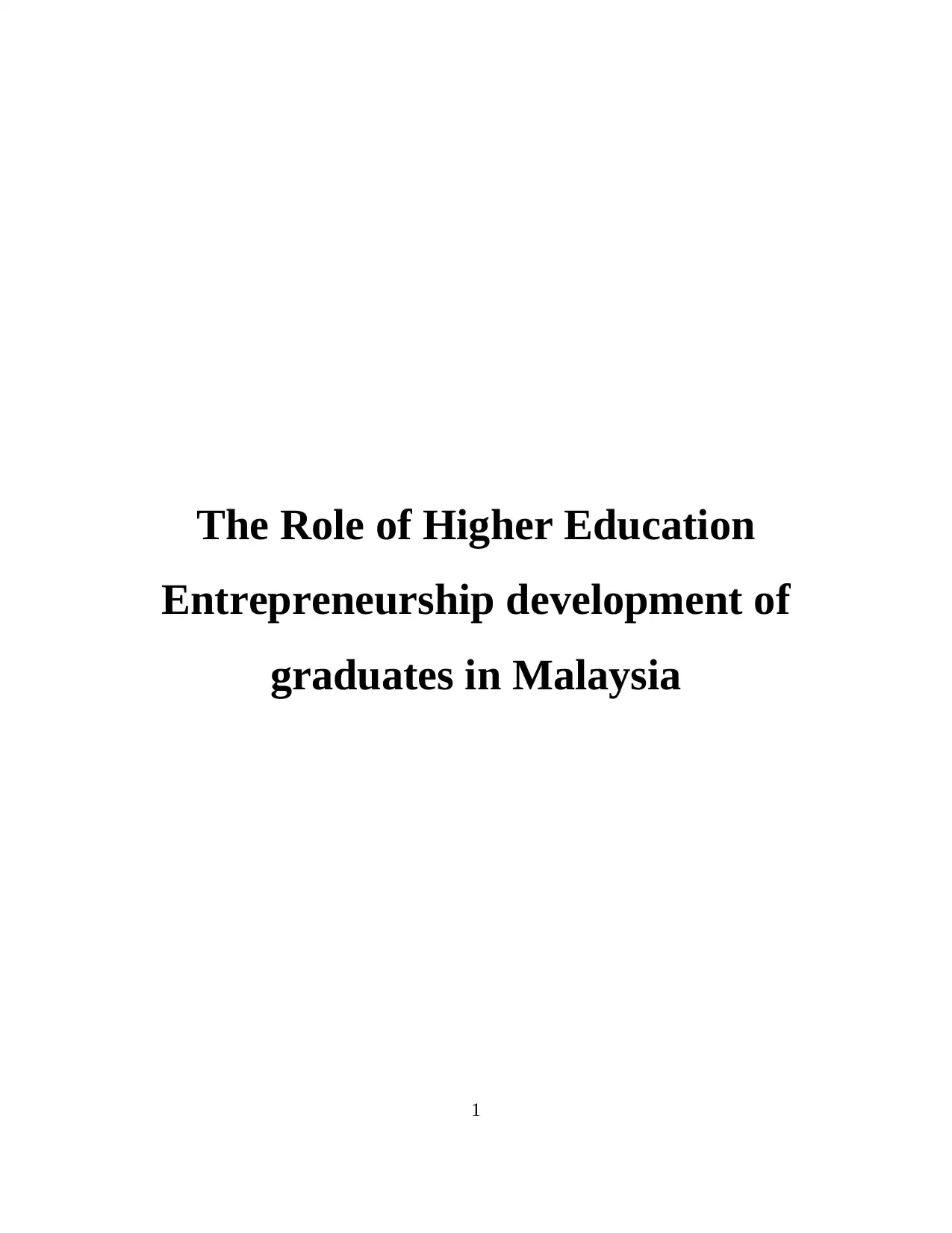
The Role of Higher Education
Entrepreneurship development of
graduates in Malaysia
1
Entrepreneurship development of
graduates in Malaysia
1
Paraphrase This Document
Need a fresh take? Get an instant paraphrase of this document with our AI Paraphraser
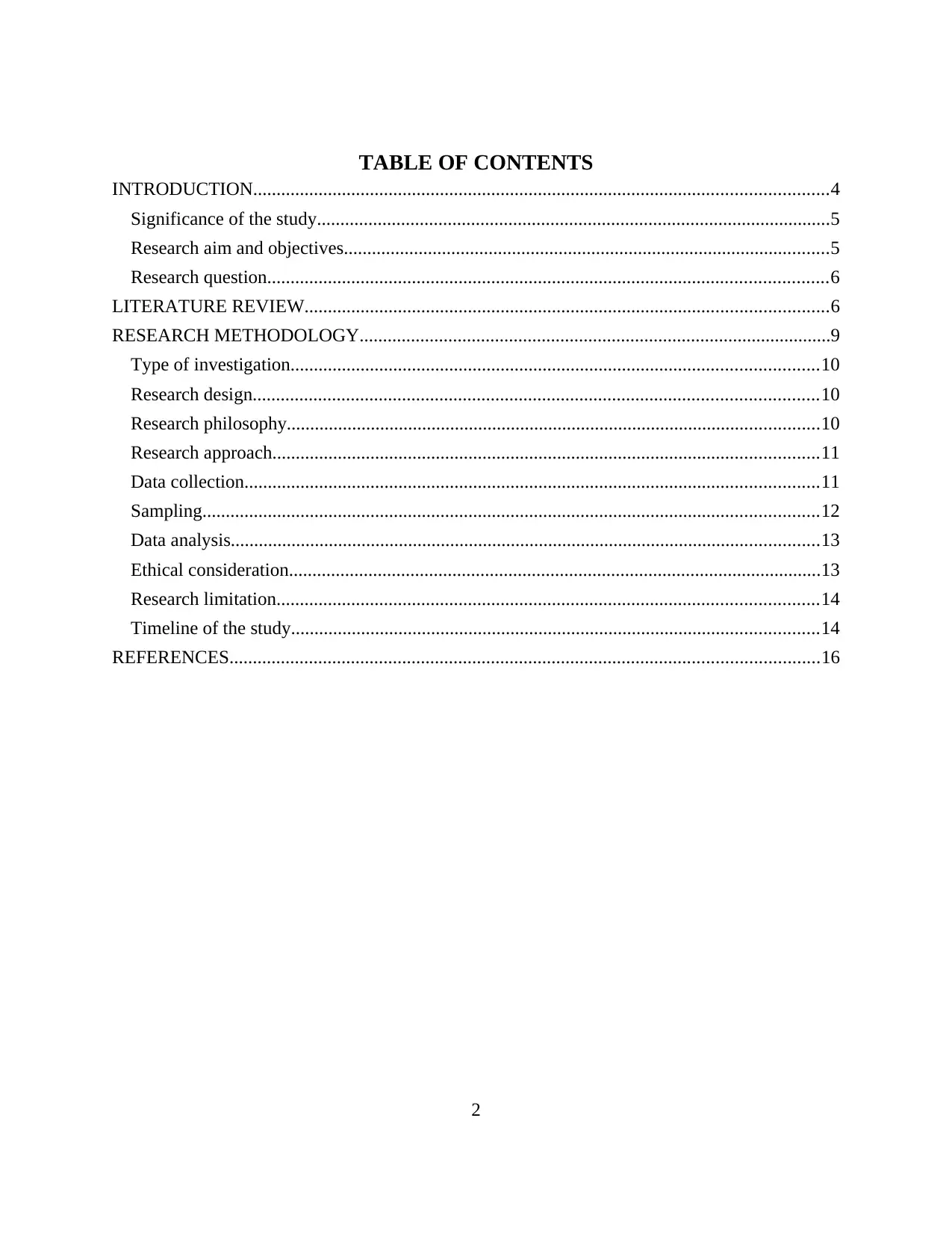
TABLE OF CONTENTS
INTRODUCTION...........................................................................................................................4
Significance of the study..............................................................................................................5
Research aim and objectives........................................................................................................5
Research question........................................................................................................................6
LITERATURE REVIEW................................................................................................................6
RESEARCH METHODOLOGY.....................................................................................................9
Type of investigation.................................................................................................................10
Research design.........................................................................................................................10
Research philosophy..................................................................................................................10
Research approach.....................................................................................................................11
Data collection...........................................................................................................................11
Sampling....................................................................................................................................12
Data analysis..............................................................................................................................13
Ethical consideration..................................................................................................................13
Research limitation....................................................................................................................14
Timeline of the study.................................................................................................................14
REFERENCES..............................................................................................................................16
2
INTRODUCTION...........................................................................................................................4
Significance of the study..............................................................................................................5
Research aim and objectives........................................................................................................5
Research question........................................................................................................................6
LITERATURE REVIEW................................................................................................................6
RESEARCH METHODOLOGY.....................................................................................................9
Type of investigation.................................................................................................................10
Research design.........................................................................................................................10
Research philosophy..................................................................................................................10
Research approach.....................................................................................................................11
Data collection...........................................................................................................................11
Sampling....................................................................................................................................12
Data analysis..............................................................................................................................13
Ethical consideration..................................................................................................................13
Research limitation....................................................................................................................14
Timeline of the study.................................................................................................................14
REFERENCES..............................................................................................................................16
2

Illustration Index
Illustration 1: Conceptual framework..............................................................................................9
3
Illustration 1: Conceptual framework..............................................................................................9
3
⊘ This is a preview!⊘
Do you want full access?
Subscribe today to unlock all pages.

Trusted by 1+ million students worldwide
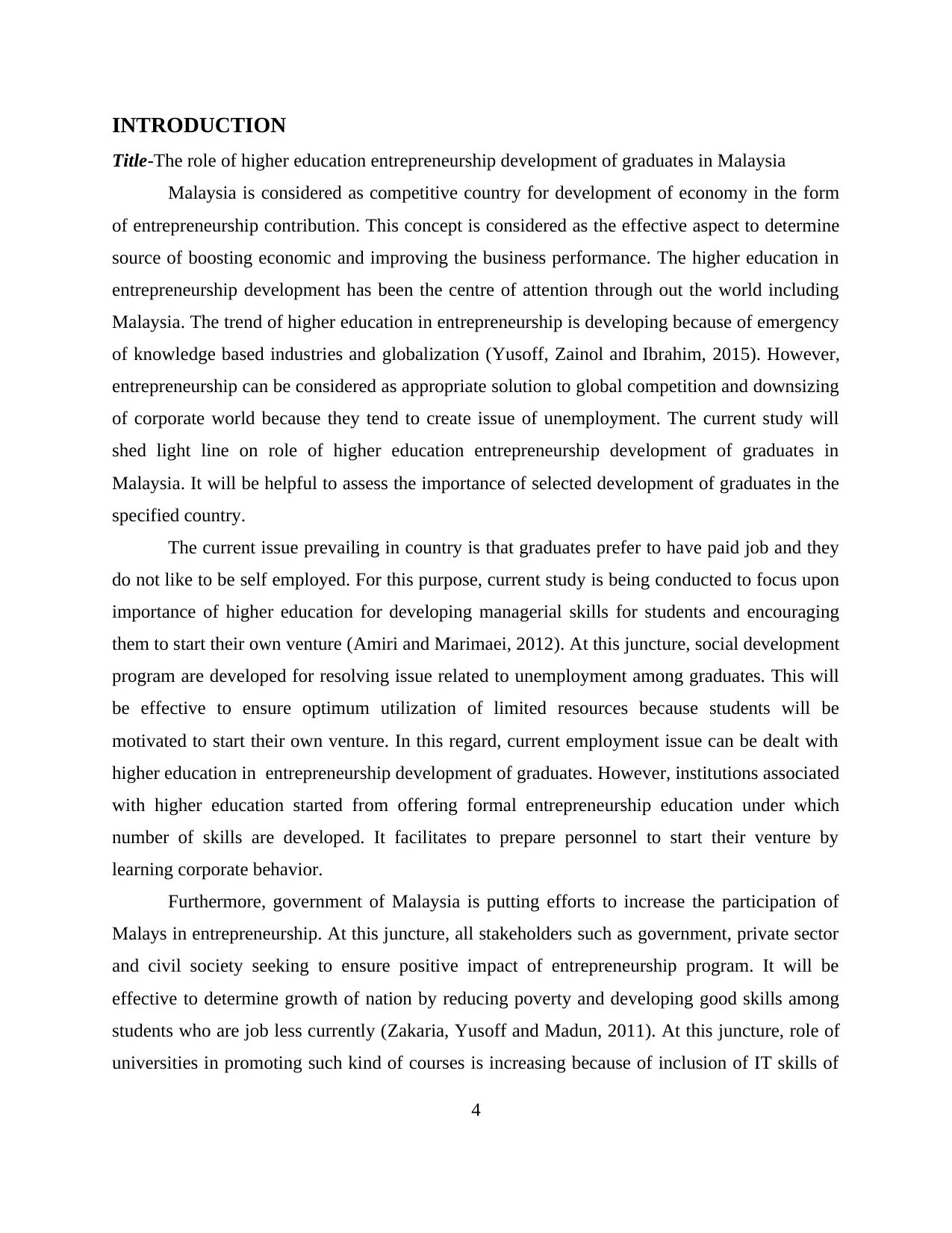
INTRODUCTION
Title-The role of higher education entrepreneurship development of graduates in Malaysia
Malaysia is considered as competitive country for development of economy in the form
of entrepreneurship contribution. This concept is considered as the effective aspect to determine
source of boosting economic and improving the business performance. The higher education in
entrepreneurship development has been the centre of attention through out the world including
Malaysia. The trend of higher education in entrepreneurship is developing because of emergency
of knowledge based industries and globalization (Yusoff, Zainol and Ibrahim, 2015). However,
entrepreneurship can be considered as appropriate solution to global competition and downsizing
of corporate world because they tend to create issue of unemployment. The current study will
shed light line on role of higher education entrepreneurship development of graduates in
Malaysia. It will be helpful to assess the importance of selected development of graduates in the
specified country.
The current issue prevailing in country is that graduates prefer to have paid job and they
do not like to be self employed. For this purpose, current study is being conducted to focus upon
importance of higher education for developing managerial skills for students and encouraging
them to start their own venture (Amiri and Marimaei, 2012). At this juncture, social development
program are developed for resolving issue related to unemployment among graduates. This will
be effective to ensure optimum utilization of limited resources because students will be
motivated to start their own venture. In this regard, current employment issue can be dealt with
higher education in entrepreneurship development of graduates. However, institutions associated
with higher education started from offering formal entrepreneurship education under which
number of skills are developed. It facilitates to prepare personnel to start their venture by
learning corporate behavior.
Furthermore, government of Malaysia is putting efforts to increase the participation of
Malays in entrepreneurship. At this juncture, all stakeholders such as government, private sector
and civil society seeking to ensure positive impact of entrepreneurship program. It will be
effective to determine growth of nation by reducing poverty and developing good skills among
students who are job less currently (Zakaria, Yusoff and Madun, 2011). At this juncture, role of
universities in promoting such kind of courses is increasing because of inclusion of IT skills of
4
Title-The role of higher education entrepreneurship development of graduates in Malaysia
Malaysia is considered as competitive country for development of economy in the form
of entrepreneurship contribution. This concept is considered as the effective aspect to determine
source of boosting economic and improving the business performance. The higher education in
entrepreneurship development has been the centre of attention through out the world including
Malaysia. The trend of higher education in entrepreneurship is developing because of emergency
of knowledge based industries and globalization (Yusoff, Zainol and Ibrahim, 2015). However,
entrepreneurship can be considered as appropriate solution to global competition and downsizing
of corporate world because they tend to create issue of unemployment. The current study will
shed light line on role of higher education entrepreneurship development of graduates in
Malaysia. It will be helpful to assess the importance of selected development of graduates in the
specified country.
The current issue prevailing in country is that graduates prefer to have paid job and they
do not like to be self employed. For this purpose, current study is being conducted to focus upon
importance of higher education for developing managerial skills for students and encouraging
them to start their own venture (Amiri and Marimaei, 2012). At this juncture, social development
program are developed for resolving issue related to unemployment among graduates. This will
be effective to ensure optimum utilization of limited resources because students will be
motivated to start their own venture. In this regard, current employment issue can be dealt with
higher education in entrepreneurship development of graduates. However, institutions associated
with higher education started from offering formal entrepreneurship education under which
number of skills are developed. It facilitates to prepare personnel to start their venture by
learning corporate behavior.
Furthermore, government of Malaysia is putting efforts to increase the participation of
Malays in entrepreneurship. At this juncture, all stakeholders such as government, private sector
and civil society seeking to ensure positive impact of entrepreneurship program. It will be
effective to determine growth of nation by reducing poverty and developing good skills among
students who are job less currently (Zakaria, Yusoff and Madun, 2011). At this juncture, role of
universities in promoting such kind of courses is increasing because of inclusion of IT skills of
4
Paraphrase This Document
Need a fresh take? Get an instant paraphrase of this document with our AI Paraphraser
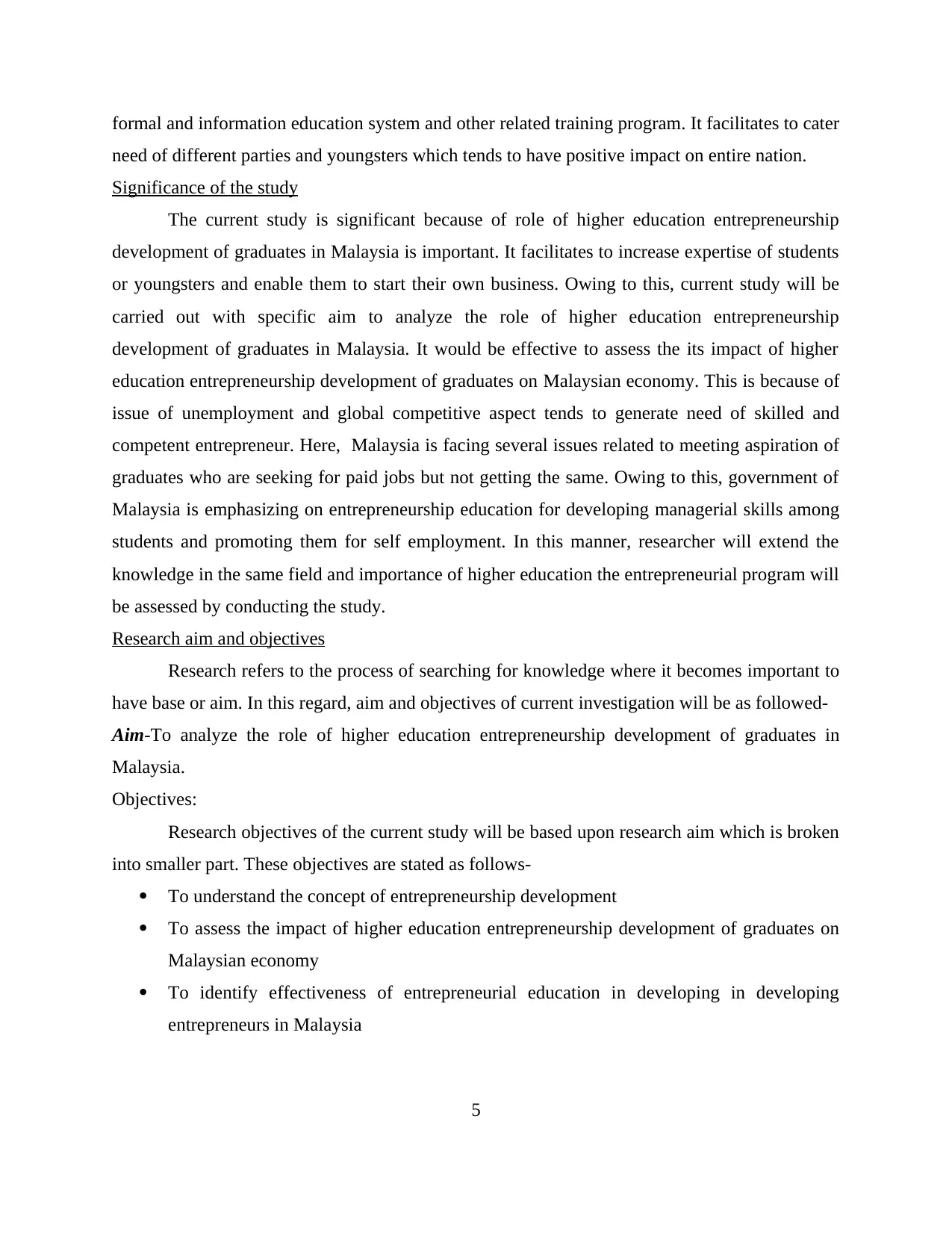
formal and information education system and other related training program. It facilitates to cater
need of different parties and youngsters which tends to have positive impact on entire nation.
Significance of the study
The current study is significant because of role of higher education entrepreneurship
development of graduates in Malaysia is important. It facilitates to increase expertise of students
or youngsters and enable them to start their own business. Owing to this, current study will be
carried out with specific aim to analyze the role of higher education entrepreneurship
development of graduates in Malaysia. It would be effective to assess the its impact of higher
education entrepreneurship development of graduates on Malaysian economy. This is because of
issue of unemployment and global competitive aspect tends to generate need of skilled and
competent entrepreneur. Here, Malaysia is facing several issues related to meeting aspiration of
graduates who are seeking for paid jobs but not getting the same. Owing to this, government of
Malaysia is emphasizing on entrepreneurship education for developing managerial skills among
students and promoting them for self employment. In this manner, researcher will extend the
knowledge in the same field and importance of higher education the entrepreneurial program will
be assessed by conducting the study.
Research aim and objectives
Research refers to the process of searching for knowledge where it becomes important to
have base or aim. In this regard, aim and objectives of current investigation will be as followed-
Aim-To analyze the role of higher education entrepreneurship development of graduates in
Malaysia.
Objectives:
Research objectives of the current study will be based upon research aim which is broken
into smaller part. These objectives are stated as follows-
To understand the concept of entrepreneurship development
To assess the impact of higher education entrepreneurship development of graduates on
Malaysian economy
To identify effectiveness of entrepreneurial education in developing in developing
entrepreneurs in Malaysia
5
need of different parties and youngsters which tends to have positive impact on entire nation.
Significance of the study
The current study is significant because of role of higher education entrepreneurship
development of graduates in Malaysia is important. It facilitates to increase expertise of students
or youngsters and enable them to start their own business. Owing to this, current study will be
carried out with specific aim to analyze the role of higher education entrepreneurship
development of graduates in Malaysia. It would be effective to assess the its impact of higher
education entrepreneurship development of graduates on Malaysian economy. This is because of
issue of unemployment and global competitive aspect tends to generate need of skilled and
competent entrepreneur. Here, Malaysia is facing several issues related to meeting aspiration of
graduates who are seeking for paid jobs but not getting the same. Owing to this, government of
Malaysia is emphasizing on entrepreneurship education for developing managerial skills among
students and promoting them for self employment. In this manner, researcher will extend the
knowledge in the same field and importance of higher education the entrepreneurial program will
be assessed by conducting the study.
Research aim and objectives
Research refers to the process of searching for knowledge where it becomes important to
have base or aim. In this regard, aim and objectives of current investigation will be as followed-
Aim-To analyze the role of higher education entrepreneurship development of graduates in
Malaysia.
Objectives:
Research objectives of the current study will be based upon research aim which is broken
into smaller part. These objectives are stated as follows-
To understand the concept of entrepreneurship development
To assess the impact of higher education entrepreneurship development of graduates on
Malaysian economy
To identify effectiveness of entrepreneurial education in developing in developing
entrepreneurs in Malaysia
5
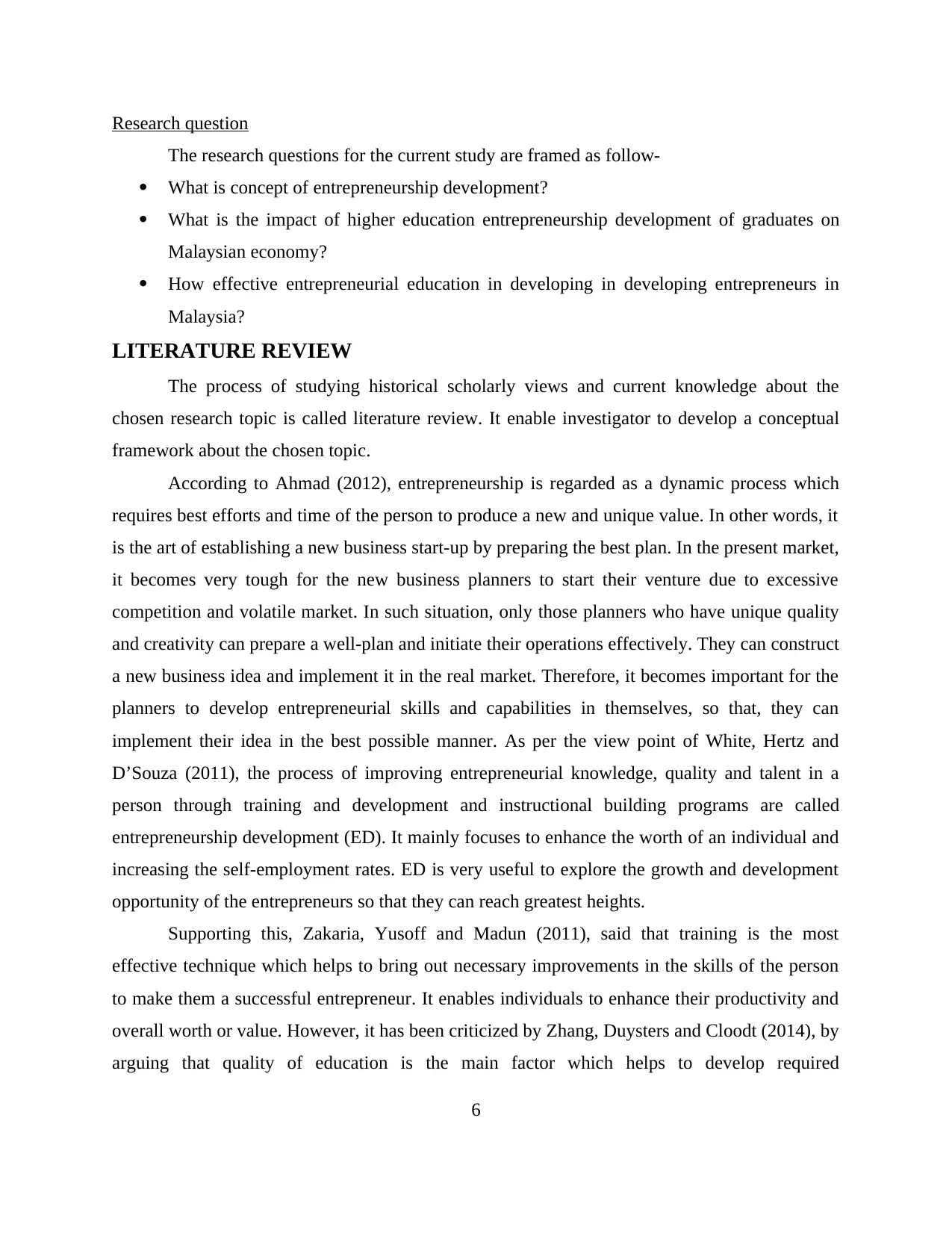
Research question
The research questions for the current study are framed as follow-
What is concept of entrepreneurship development?
What is the impact of higher education entrepreneurship development of graduates on
Malaysian economy?
How effective entrepreneurial education in developing in developing entrepreneurs in
Malaysia?
LITERATURE REVIEW
The process of studying historical scholarly views and current knowledge about the
chosen research topic is called literature review. It enable investigator to develop a conceptual
framework about the chosen topic.
According to Ahmad (2012), entrepreneurship is regarded as a dynamic process which
requires best efforts and time of the person to produce a new and unique value. In other words, it
is the art of establishing a new business start-up by preparing the best plan. In the present market,
it becomes very tough for the new business planners to start their venture due to excessive
competition and volatile market. In such situation, only those planners who have unique quality
and creativity can prepare a well-plan and initiate their operations effectively. They can construct
a new business idea and implement it in the real market. Therefore, it becomes important for the
planners to develop entrepreneurial skills and capabilities in themselves, so that, they can
implement their idea in the best possible manner. As per the view point of White, Hertz and
D’Souza (2011), the process of improving entrepreneurial knowledge, quality and talent in a
person through training and development and instructional building programs are called
entrepreneurship development (ED). It mainly focuses to enhance the worth of an individual and
increasing the self-employment rates. ED is very useful to explore the growth and development
opportunity of the entrepreneurs so that they can reach greatest heights.
Supporting this, Zakaria, Yusoff and Madun (2011), said that training is the most
effective technique which helps to bring out necessary improvements in the skills of the person
to make them a successful entrepreneur. It enables individuals to enhance their productivity and
overall worth or value. However, it has been criticized by Zhang, Duysters and Cloodt (2014), by
arguing that quality of education is the main factor which helps to develop required
6
The research questions for the current study are framed as follow-
What is concept of entrepreneurship development?
What is the impact of higher education entrepreneurship development of graduates on
Malaysian economy?
How effective entrepreneurial education in developing in developing entrepreneurs in
Malaysia?
LITERATURE REVIEW
The process of studying historical scholarly views and current knowledge about the
chosen research topic is called literature review. It enable investigator to develop a conceptual
framework about the chosen topic.
According to Ahmad (2012), entrepreneurship is regarded as a dynamic process which
requires best efforts and time of the person to produce a new and unique value. In other words, it
is the art of establishing a new business start-up by preparing the best plan. In the present market,
it becomes very tough for the new business planners to start their venture due to excessive
competition and volatile market. In such situation, only those planners who have unique quality
and creativity can prepare a well-plan and initiate their operations effectively. They can construct
a new business idea and implement it in the real market. Therefore, it becomes important for the
planners to develop entrepreneurial skills and capabilities in themselves, so that, they can
implement their idea in the best possible manner. As per the view point of White, Hertz and
D’Souza (2011), the process of improving entrepreneurial knowledge, quality and talent in a
person through training and development and instructional building programs are called
entrepreneurship development (ED). It mainly focuses to enhance the worth of an individual and
increasing the self-employment rates. ED is very useful to explore the growth and development
opportunity of the entrepreneurs so that they can reach greatest heights.
Supporting this, Zakaria, Yusoff and Madun (2011), said that training is the most
effective technique which helps to bring out necessary improvements in the skills of the person
to make them a successful entrepreneur. It enables individuals to enhance their productivity and
overall worth or value. However, it has been criticized by Zhang, Duysters and Cloodt (2014), by
arguing that quality of education is the main factor which helps to develop required
6
⊘ This is a preview!⊘
Do you want full access?
Subscribe today to unlock all pages.

Trusted by 1+ million students worldwide
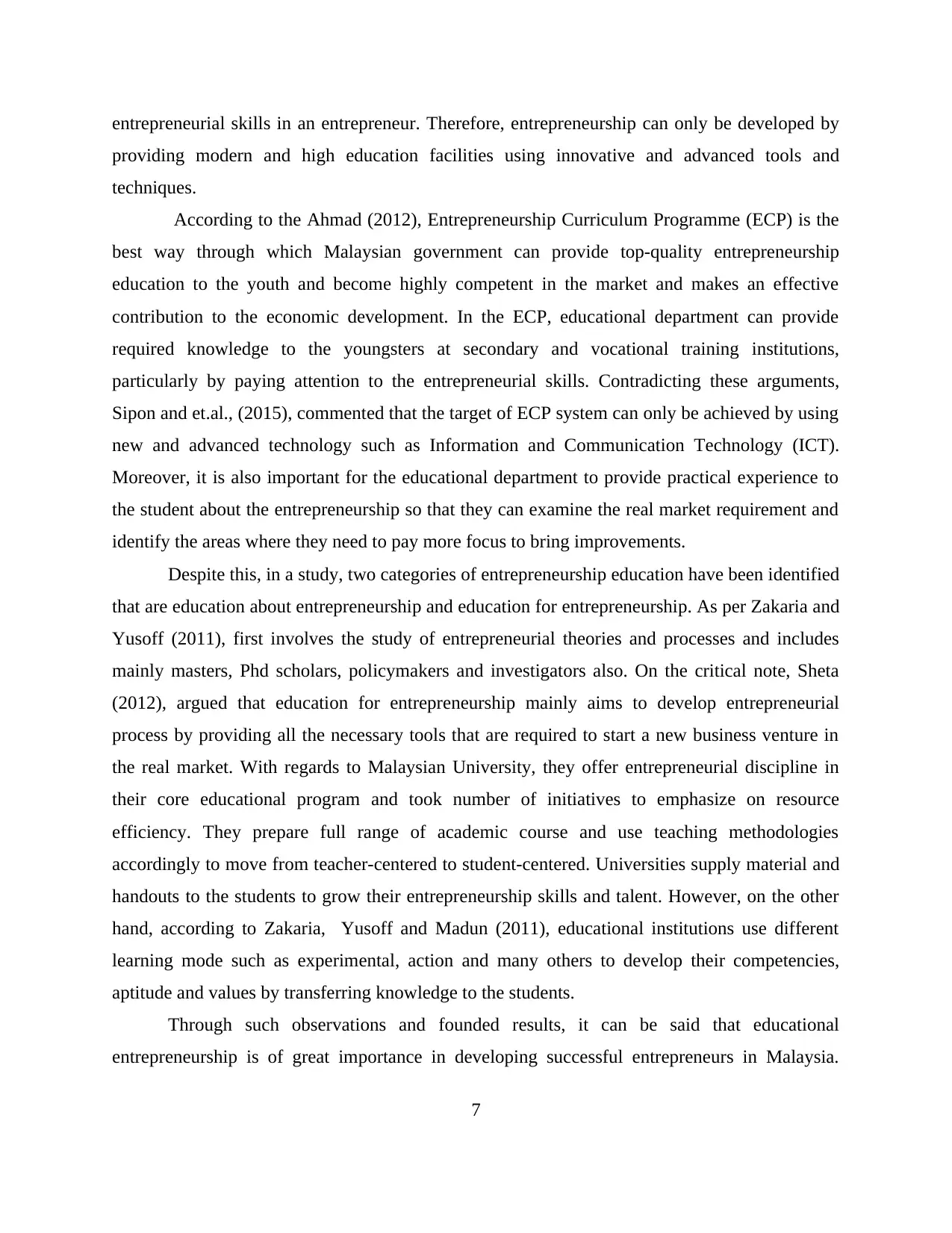
entrepreneurial skills in an entrepreneur. Therefore, entrepreneurship can only be developed by
providing modern and high education facilities using innovative and advanced tools and
techniques.
According to the Ahmad (2012), Entrepreneurship Curriculum Programme (ECP) is the
best way through which Malaysian government can provide top-quality entrepreneurship
education to the youth and become highly competent in the market and makes an effective
contribution to the economic development. In the ECP, educational department can provide
required knowledge to the youngsters at secondary and vocational training institutions,
particularly by paying attention to the entrepreneurial skills. Contradicting these arguments,
Sipon and et.al., (2015), commented that the target of ECP system can only be achieved by using
new and advanced technology such as Information and Communication Technology (ICT).
Moreover, it is also important for the educational department to provide practical experience to
the student about the entrepreneurship so that they can examine the real market requirement and
identify the areas where they need to pay more focus to bring improvements.
Despite this, in a study, two categories of entrepreneurship education have been identified
that are education about entrepreneurship and education for entrepreneurship. As per Zakaria and
Yusoff (2011), first involves the study of entrepreneurial theories and processes and includes
mainly masters, Phd scholars, policymakers and investigators also. On the critical note, Sheta
(2012), argued that education for entrepreneurship mainly aims to develop entrepreneurial
process by providing all the necessary tools that are required to start a new business venture in
the real market. With regards to Malaysian University, they offer entrepreneurial discipline in
their core educational program and took number of initiatives to emphasize on resource
efficiency. They prepare full range of academic course and use teaching methodologies
accordingly to move from teacher-centered to student-centered. Universities supply material and
handouts to the students to grow their entrepreneurship skills and talent. However, on the other
hand, according to Zakaria, Yusoff and Madun (2011), educational institutions use different
learning mode such as experimental, action and many others to develop their competencies,
aptitude and values by transferring knowledge to the students.
Through such observations and founded results, it can be said that educational
entrepreneurship is of great importance in developing successful entrepreneurs in Malaysia.
7
providing modern and high education facilities using innovative and advanced tools and
techniques.
According to the Ahmad (2012), Entrepreneurship Curriculum Programme (ECP) is the
best way through which Malaysian government can provide top-quality entrepreneurship
education to the youth and become highly competent in the market and makes an effective
contribution to the economic development. In the ECP, educational department can provide
required knowledge to the youngsters at secondary and vocational training institutions,
particularly by paying attention to the entrepreneurial skills. Contradicting these arguments,
Sipon and et.al., (2015), commented that the target of ECP system can only be achieved by using
new and advanced technology such as Information and Communication Technology (ICT).
Moreover, it is also important for the educational department to provide practical experience to
the student about the entrepreneurship so that they can examine the real market requirement and
identify the areas where they need to pay more focus to bring improvements.
Despite this, in a study, two categories of entrepreneurship education have been identified
that are education about entrepreneurship and education for entrepreneurship. As per Zakaria and
Yusoff (2011), first involves the study of entrepreneurial theories and processes and includes
mainly masters, Phd scholars, policymakers and investigators also. On the critical note, Sheta
(2012), argued that education for entrepreneurship mainly aims to develop entrepreneurial
process by providing all the necessary tools that are required to start a new business venture in
the real market. With regards to Malaysian University, they offer entrepreneurial discipline in
their core educational program and took number of initiatives to emphasize on resource
efficiency. They prepare full range of academic course and use teaching methodologies
accordingly to move from teacher-centered to student-centered. Universities supply material and
handouts to the students to grow their entrepreneurship skills and talent. However, on the other
hand, according to Zakaria, Yusoff and Madun (2011), educational institutions use different
learning mode such as experimental, action and many others to develop their competencies,
aptitude and values by transferring knowledge to the students.
Through such observations and founded results, it can be said that educational
entrepreneurship is of great importance in developing successful entrepreneurs in Malaysia.
7
Paraphrase This Document
Need a fresh take? Get an instant paraphrase of this document with our AI Paraphraser
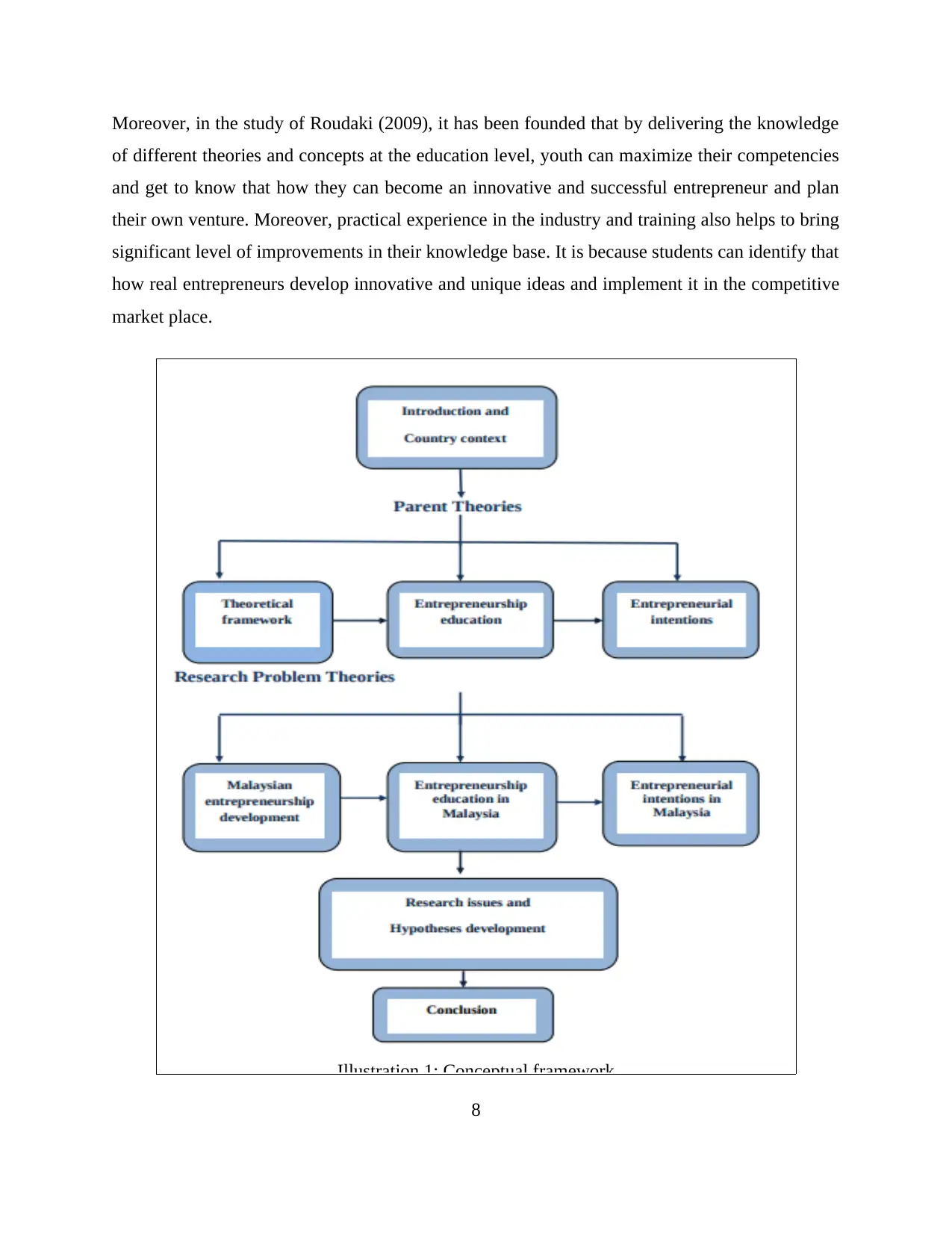
Moreover, in the study of Roudaki (2009), it has been founded that by delivering the knowledge
of different theories and concepts at the education level, youth can maximize their competencies
and get to know that how they can become an innovative and successful entrepreneur and plan
their own venture. Moreover, practical experience in the industry and training also helps to bring
significant level of improvements in their knowledge base. It is because students can identify that
how real entrepreneurs develop innovative and unique ideas and implement it in the competitive
market place.
8
Illustration 1: Conceptual framework
of different theories and concepts at the education level, youth can maximize their competencies
and get to know that how they can become an innovative and successful entrepreneur and plan
their own venture. Moreover, practical experience in the industry and training also helps to bring
significant level of improvements in their knowledge base. It is because students can identify that
how real entrepreneurs develop innovative and unique ideas and implement it in the competitive
market place.
8
Illustration 1: Conceptual framework
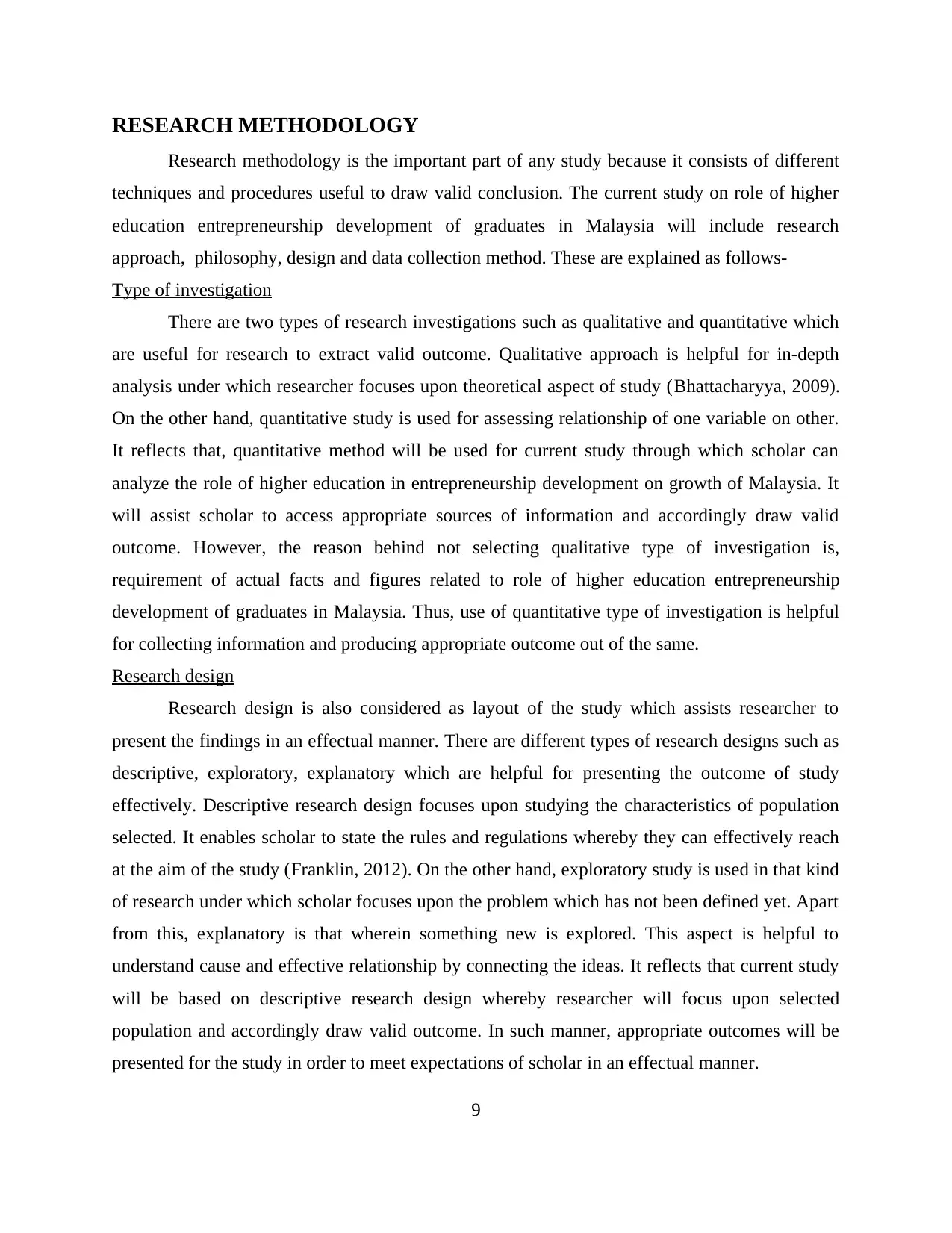
RESEARCH METHODOLOGY
Research methodology is the important part of any study because it consists of different
techniques and procedures useful to draw valid conclusion. The current study on role of higher
education entrepreneurship development of graduates in Malaysia will include research
approach, philosophy, design and data collection method. These are explained as follows-
Type of investigation
There are two types of research investigations such as qualitative and quantitative which
are useful for research to extract valid outcome. Qualitative approach is helpful for in-depth
analysis under which researcher focuses upon theoretical aspect of study (Bhattacharyya, 2009).
On the other hand, quantitative study is used for assessing relationship of one variable on other.
It reflects that, quantitative method will be used for current study through which scholar can
analyze the role of higher education in entrepreneurship development on growth of Malaysia. It
will assist scholar to access appropriate sources of information and accordingly draw valid
outcome. However, the reason behind not selecting qualitative type of investigation is,
requirement of actual facts and figures related to role of higher education entrepreneurship
development of graduates in Malaysia. Thus, use of quantitative type of investigation is helpful
for collecting information and producing appropriate outcome out of the same.
Research design
Research design is also considered as layout of the study which assists researcher to
present the findings in an effectual manner. There are different types of research designs such as
descriptive, exploratory, explanatory which are helpful for presenting the outcome of study
effectively. Descriptive research design focuses upon studying the characteristics of population
selected. It enables scholar to state the rules and regulations whereby they can effectively reach
at the aim of the study (Franklin, 2012). On the other hand, exploratory study is used in that kind
of research under which scholar focuses upon the problem which has not been defined yet. Apart
from this, explanatory is that wherein something new is explored. This aspect is helpful to
understand cause and effective relationship by connecting the ideas. It reflects that current study
will be based on descriptive research design whereby researcher will focus upon selected
population and accordingly draw valid outcome. In such manner, appropriate outcomes will be
presented for the study in order to meet expectations of scholar in an effectual manner.
9
Research methodology is the important part of any study because it consists of different
techniques and procedures useful to draw valid conclusion. The current study on role of higher
education entrepreneurship development of graduates in Malaysia will include research
approach, philosophy, design and data collection method. These are explained as follows-
Type of investigation
There are two types of research investigations such as qualitative and quantitative which
are useful for research to extract valid outcome. Qualitative approach is helpful for in-depth
analysis under which researcher focuses upon theoretical aspect of study (Bhattacharyya, 2009).
On the other hand, quantitative study is used for assessing relationship of one variable on other.
It reflects that, quantitative method will be used for current study through which scholar can
analyze the role of higher education in entrepreneurship development on growth of Malaysia. It
will assist scholar to access appropriate sources of information and accordingly draw valid
outcome. However, the reason behind not selecting qualitative type of investigation is,
requirement of actual facts and figures related to role of higher education entrepreneurship
development of graduates in Malaysia. Thus, use of quantitative type of investigation is helpful
for collecting information and producing appropriate outcome out of the same.
Research design
Research design is also considered as layout of the study which assists researcher to
present the findings in an effectual manner. There are different types of research designs such as
descriptive, exploratory, explanatory which are helpful for presenting the outcome of study
effectively. Descriptive research design focuses upon studying the characteristics of population
selected. It enables scholar to state the rules and regulations whereby they can effectively reach
at the aim of the study (Franklin, 2012). On the other hand, exploratory study is used in that kind
of research under which scholar focuses upon the problem which has not been defined yet. Apart
from this, explanatory is that wherein something new is explored. This aspect is helpful to
understand cause and effective relationship by connecting the ideas. It reflects that current study
will be based on descriptive research design whereby researcher will focus upon selected
population and accordingly draw valid outcome. In such manner, appropriate outcomes will be
presented for the study in order to meet expectations of scholar in an effectual manner.
9
⊘ This is a preview!⊘
Do you want full access?
Subscribe today to unlock all pages.

Trusted by 1+ million students worldwide
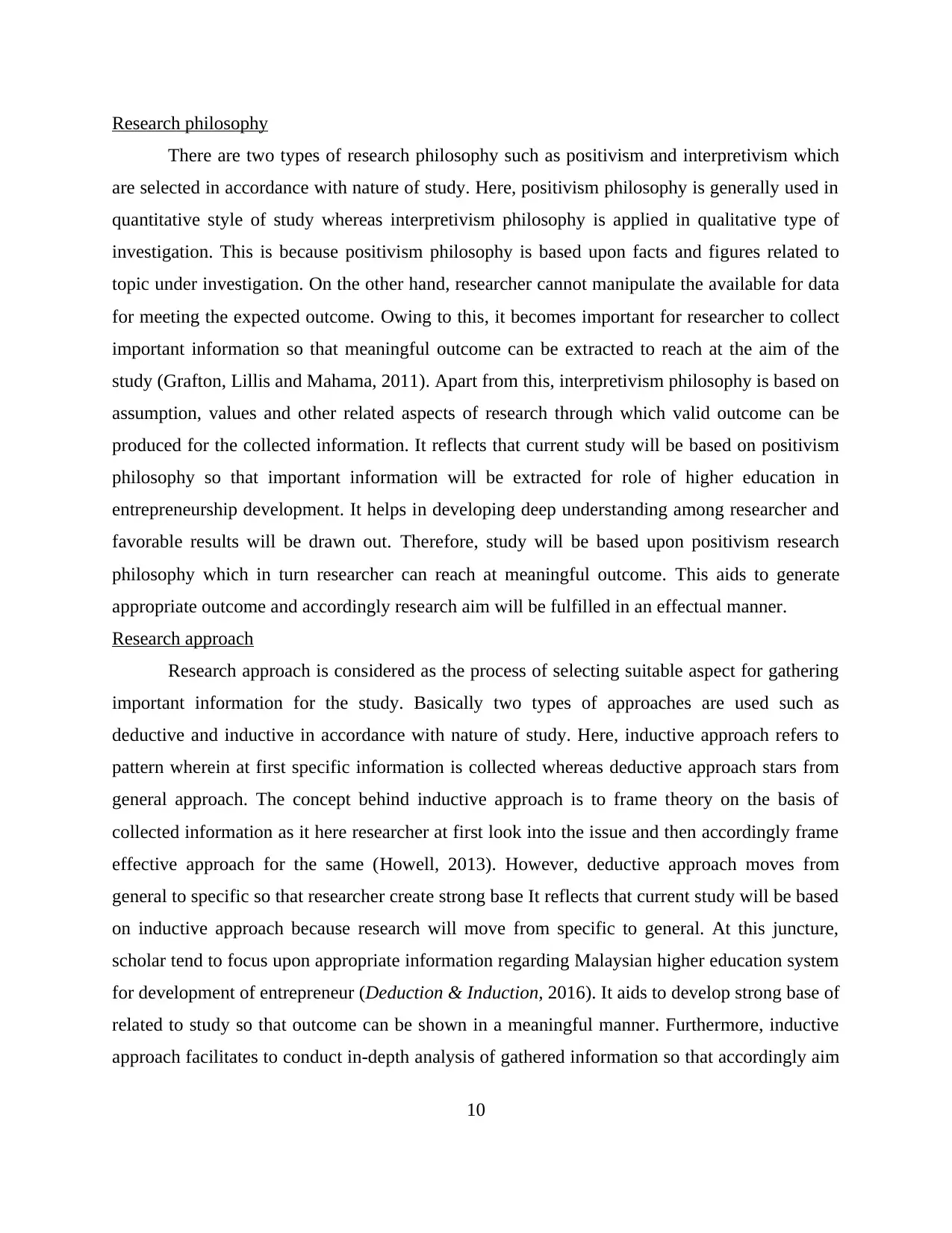
Research philosophy
There are two types of research philosophy such as positivism and interpretivism which
are selected in accordance with nature of study. Here, positivism philosophy is generally used in
quantitative style of study whereas interpretivism philosophy is applied in qualitative type of
investigation. This is because positivism philosophy is based upon facts and figures related to
topic under investigation. On the other hand, researcher cannot manipulate the available for data
for meeting the expected outcome. Owing to this, it becomes important for researcher to collect
important information so that meaningful outcome can be extracted to reach at the aim of the
study (Grafton, Lillis and Mahama, 2011). Apart from this, interpretivism philosophy is based on
assumption, values and other related aspects of research through which valid outcome can be
produced for the collected information. It reflects that current study will be based on positivism
philosophy so that important information will be extracted for role of higher education in
entrepreneurship development. It helps in developing deep understanding among researcher and
favorable results will be drawn out. Therefore, study will be based upon positivism research
philosophy which in turn researcher can reach at meaningful outcome. This aids to generate
appropriate outcome and accordingly research aim will be fulfilled in an effectual manner.
Research approach
Research approach is considered as the process of selecting suitable aspect for gathering
important information for the study. Basically two types of approaches are used such as
deductive and inductive in accordance with nature of study. Here, inductive approach refers to
pattern wherein at first specific information is collected whereas deductive approach stars from
general approach. The concept behind inductive approach is to frame theory on the basis of
collected information as it here researcher at first look into the issue and then accordingly frame
effective approach for the same (Howell, 2013). However, deductive approach moves from
general to specific so that researcher create strong base It reflects that current study will be based
on inductive approach because research will move from specific to general. At this juncture,
scholar tend to focus upon appropriate information regarding Malaysian higher education system
for development of entrepreneur (Deduction & Induction, 2016). It aids to develop strong base of
related to study so that outcome can be shown in a meaningful manner. Furthermore, inductive
approach facilitates to conduct in-depth analysis of gathered information so that accordingly aim
10
There are two types of research philosophy such as positivism and interpretivism which
are selected in accordance with nature of study. Here, positivism philosophy is generally used in
quantitative style of study whereas interpretivism philosophy is applied in qualitative type of
investigation. This is because positivism philosophy is based upon facts and figures related to
topic under investigation. On the other hand, researcher cannot manipulate the available for data
for meeting the expected outcome. Owing to this, it becomes important for researcher to collect
important information so that meaningful outcome can be extracted to reach at the aim of the
study (Grafton, Lillis and Mahama, 2011). Apart from this, interpretivism philosophy is based on
assumption, values and other related aspects of research through which valid outcome can be
produced for the collected information. It reflects that current study will be based on positivism
philosophy so that important information will be extracted for role of higher education in
entrepreneurship development. It helps in developing deep understanding among researcher and
favorable results will be drawn out. Therefore, study will be based upon positivism research
philosophy which in turn researcher can reach at meaningful outcome. This aids to generate
appropriate outcome and accordingly research aim will be fulfilled in an effectual manner.
Research approach
Research approach is considered as the process of selecting suitable aspect for gathering
important information for the study. Basically two types of approaches are used such as
deductive and inductive in accordance with nature of study. Here, inductive approach refers to
pattern wherein at first specific information is collected whereas deductive approach stars from
general approach. The concept behind inductive approach is to frame theory on the basis of
collected information as it here researcher at first look into the issue and then accordingly frame
effective approach for the same (Howell, 2013). However, deductive approach moves from
general to specific so that researcher create strong base It reflects that current study will be based
on inductive approach because research will move from specific to general. At this juncture,
scholar tend to focus upon appropriate information regarding Malaysian higher education system
for development of entrepreneur (Deduction & Induction, 2016). It aids to develop strong base of
related to study so that outcome can be shown in a meaningful manner. Furthermore, inductive
approach facilitates to conduct in-depth analysis of gathered information so that accordingly aim
10
Paraphrase This Document
Need a fresh take? Get an instant paraphrase of this document with our AI Paraphraser
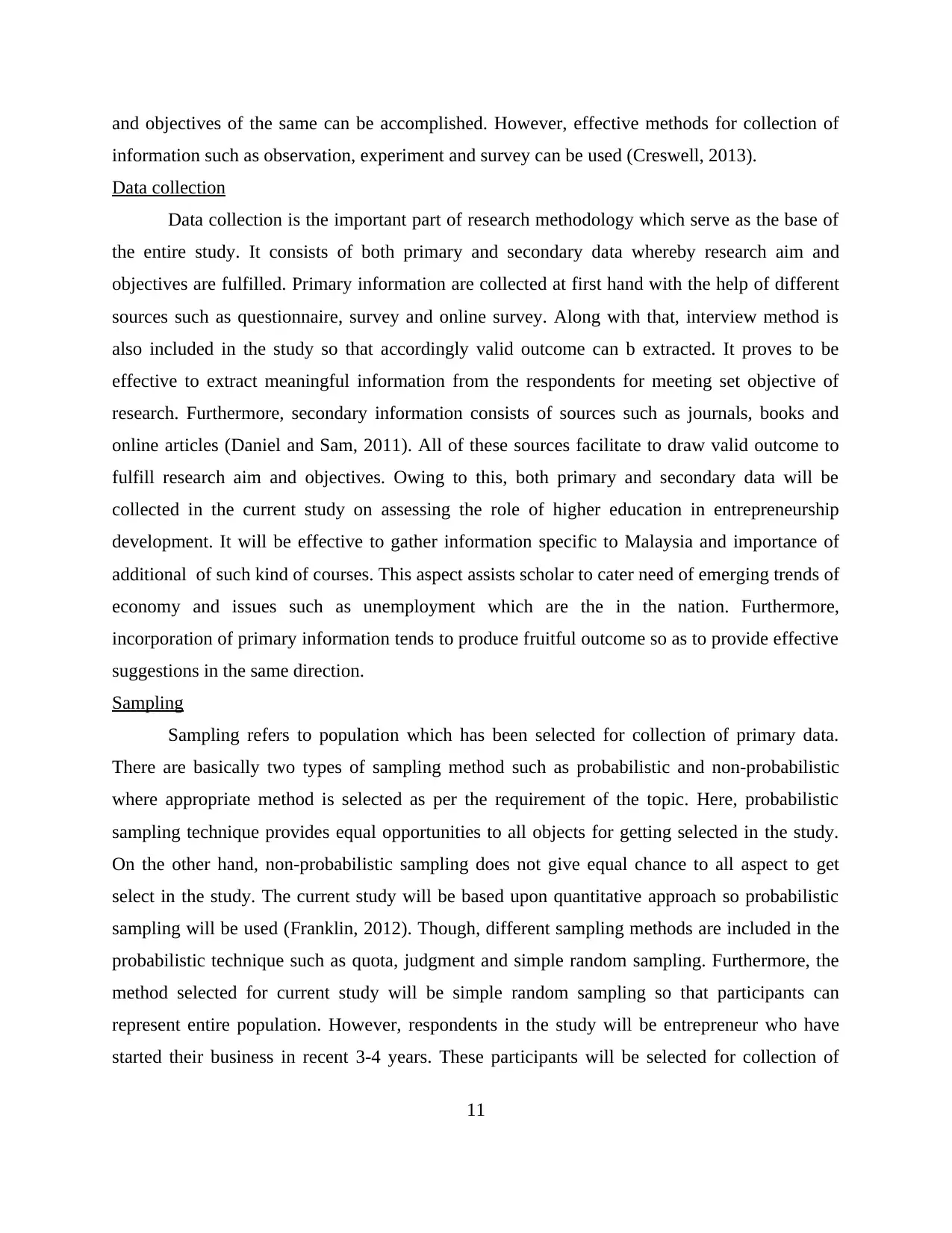
and objectives of the same can be accomplished. However, effective methods for collection of
information such as observation, experiment and survey can be used (Creswell, 2013).
Data collection
Data collection is the important part of research methodology which serve as the base of
the entire study. It consists of both primary and secondary data whereby research aim and
objectives are fulfilled. Primary information are collected at first hand with the help of different
sources such as questionnaire, survey and online survey. Along with that, interview method is
also included in the study so that accordingly valid outcome can b extracted. It proves to be
effective to extract meaningful information from the respondents for meeting set objective of
research. Furthermore, secondary information consists of sources such as journals, books and
online articles (Daniel and Sam, 2011). All of these sources facilitate to draw valid outcome to
fulfill research aim and objectives. Owing to this, both primary and secondary data will be
collected in the current study on assessing the role of higher education in entrepreneurship
development. It will be effective to gather information specific to Malaysia and importance of
additional of such kind of courses. This aspect assists scholar to cater need of emerging trends of
economy and issues such as unemployment which are the in the nation. Furthermore,
incorporation of primary information tends to produce fruitful outcome so as to provide effective
suggestions in the same direction.
Sampling
Sampling refers to population which has been selected for collection of primary data.
There are basically two types of sampling method such as probabilistic and non-probabilistic
where appropriate method is selected as per the requirement of the topic. Here, probabilistic
sampling technique provides equal opportunities to all objects for getting selected in the study.
On the other hand, non-probabilistic sampling does not give equal chance to all aspect to get
select in the study. The current study will be based upon quantitative approach so probabilistic
sampling will be used (Franklin, 2012). Though, different sampling methods are included in the
probabilistic technique such as quota, judgment and simple random sampling. Furthermore, the
method selected for current study will be simple random sampling so that participants can
represent entire population. However, respondents in the study will be entrepreneur who have
started their business in recent 3-4 years. These participants will be selected for collection of
11
information such as observation, experiment and survey can be used (Creswell, 2013).
Data collection
Data collection is the important part of research methodology which serve as the base of
the entire study. It consists of both primary and secondary data whereby research aim and
objectives are fulfilled. Primary information are collected at first hand with the help of different
sources such as questionnaire, survey and online survey. Along with that, interview method is
also included in the study so that accordingly valid outcome can b extracted. It proves to be
effective to extract meaningful information from the respondents for meeting set objective of
research. Furthermore, secondary information consists of sources such as journals, books and
online articles (Daniel and Sam, 2011). All of these sources facilitate to draw valid outcome to
fulfill research aim and objectives. Owing to this, both primary and secondary data will be
collected in the current study on assessing the role of higher education in entrepreneurship
development. It will be effective to gather information specific to Malaysia and importance of
additional of such kind of courses. This aspect assists scholar to cater need of emerging trends of
economy and issues such as unemployment which are the in the nation. Furthermore,
incorporation of primary information tends to produce fruitful outcome so as to provide effective
suggestions in the same direction.
Sampling
Sampling refers to population which has been selected for collection of primary data.
There are basically two types of sampling method such as probabilistic and non-probabilistic
where appropriate method is selected as per the requirement of the topic. Here, probabilistic
sampling technique provides equal opportunities to all objects for getting selected in the study.
On the other hand, non-probabilistic sampling does not give equal chance to all aspect to get
select in the study. The current study will be based upon quantitative approach so probabilistic
sampling will be used (Franklin, 2012). Though, different sampling methods are included in the
probabilistic technique such as quota, judgment and simple random sampling. Furthermore, the
method selected for current study will be simple random sampling so that participants can
represent entire population. However, respondents in the study will be entrepreneur who have
started their business in recent 3-4 years. These participants will be selected for collection of
11
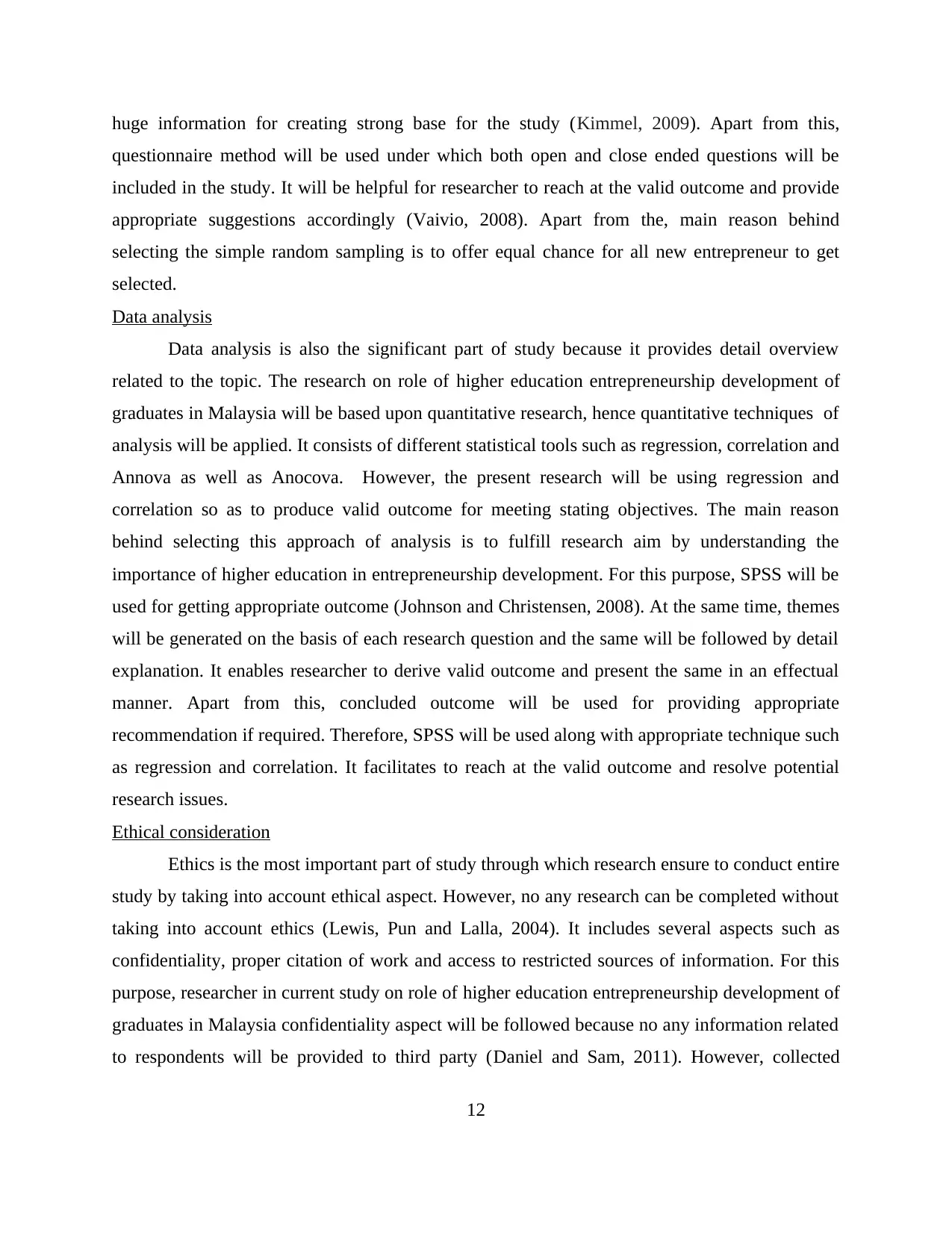
huge information for creating strong base for the study (Kimmel, 2009). Apart from this,
questionnaire method will be used under which both open and close ended questions will be
included in the study. It will be helpful for researcher to reach at the valid outcome and provide
appropriate suggestions accordingly (Vaivio, 2008). Apart from the, main reason behind
selecting the simple random sampling is to offer equal chance for all new entrepreneur to get
selected.
Data analysis
Data analysis is also the significant part of study because it provides detail overview
related to the topic. The research on role of higher education entrepreneurship development of
graduates in Malaysia will be based upon quantitative research, hence quantitative techniques of
analysis will be applied. It consists of different statistical tools such as regression, correlation and
Annova as well as Anocova. However, the present research will be using regression and
correlation so as to produce valid outcome for meeting stating objectives. The main reason
behind selecting this approach of analysis is to fulfill research aim by understanding the
importance of higher education in entrepreneurship development. For this purpose, SPSS will be
used for getting appropriate outcome (Johnson and Christensen, 2008). At the same time, themes
will be generated on the basis of each research question and the same will be followed by detail
explanation. It enables researcher to derive valid outcome and present the same in an effectual
manner. Apart from this, concluded outcome will be used for providing appropriate
recommendation if required. Therefore, SPSS will be used along with appropriate technique such
as regression and correlation. It facilitates to reach at the valid outcome and resolve potential
research issues.
Ethical consideration
Ethics is the most important part of study through which research ensure to conduct entire
study by taking into account ethical aspect. However, no any research can be completed without
taking into account ethics (Lewis, Pun and Lalla, 2004). It includes several aspects such as
confidentiality, proper citation of work and access to restricted sources of information. For this
purpose, researcher in current study on role of higher education entrepreneurship development of
graduates in Malaysia confidentiality aspect will be followed because no any information related
to respondents will be provided to third party (Daniel and Sam, 2011). However, collected
12
questionnaire method will be used under which both open and close ended questions will be
included in the study. It will be helpful for researcher to reach at the valid outcome and provide
appropriate suggestions accordingly (Vaivio, 2008). Apart from the, main reason behind
selecting the simple random sampling is to offer equal chance for all new entrepreneur to get
selected.
Data analysis
Data analysis is also the significant part of study because it provides detail overview
related to the topic. The research on role of higher education entrepreneurship development of
graduates in Malaysia will be based upon quantitative research, hence quantitative techniques of
analysis will be applied. It consists of different statistical tools such as regression, correlation and
Annova as well as Anocova. However, the present research will be using regression and
correlation so as to produce valid outcome for meeting stating objectives. The main reason
behind selecting this approach of analysis is to fulfill research aim by understanding the
importance of higher education in entrepreneurship development. For this purpose, SPSS will be
used for getting appropriate outcome (Johnson and Christensen, 2008). At the same time, themes
will be generated on the basis of each research question and the same will be followed by detail
explanation. It enables researcher to derive valid outcome and present the same in an effectual
manner. Apart from this, concluded outcome will be used for providing appropriate
recommendation if required. Therefore, SPSS will be used along with appropriate technique such
as regression and correlation. It facilitates to reach at the valid outcome and resolve potential
research issues.
Ethical consideration
Ethics is the most important part of study through which research ensure to conduct entire
study by taking into account ethical aspect. However, no any research can be completed without
taking into account ethics (Lewis, Pun and Lalla, 2004). It includes several aspects such as
confidentiality, proper citation of work and access to restricted sources of information. For this
purpose, researcher in current study on role of higher education entrepreneurship development of
graduates in Malaysia confidentiality aspect will be followed because no any information related
to respondents will be provided to third party (Daniel and Sam, 2011). However, collected
12
⊘ This is a preview!⊘
Do you want full access?
Subscribe today to unlock all pages.

Trusted by 1+ million students worldwide
1 out of 17
Related Documents
Your All-in-One AI-Powered Toolkit for Academic Success.
+13062052269
info@desklib.com
Available 24*7 on WhatsApp / Email
![[object Object]](/_next/static/media/star-bottom.7253800d.svg)
Unlock your academic potential
Copyright © 2020–2026 A2Z Services. All Rights Reserved. Developed and managed by ZUCOL.





